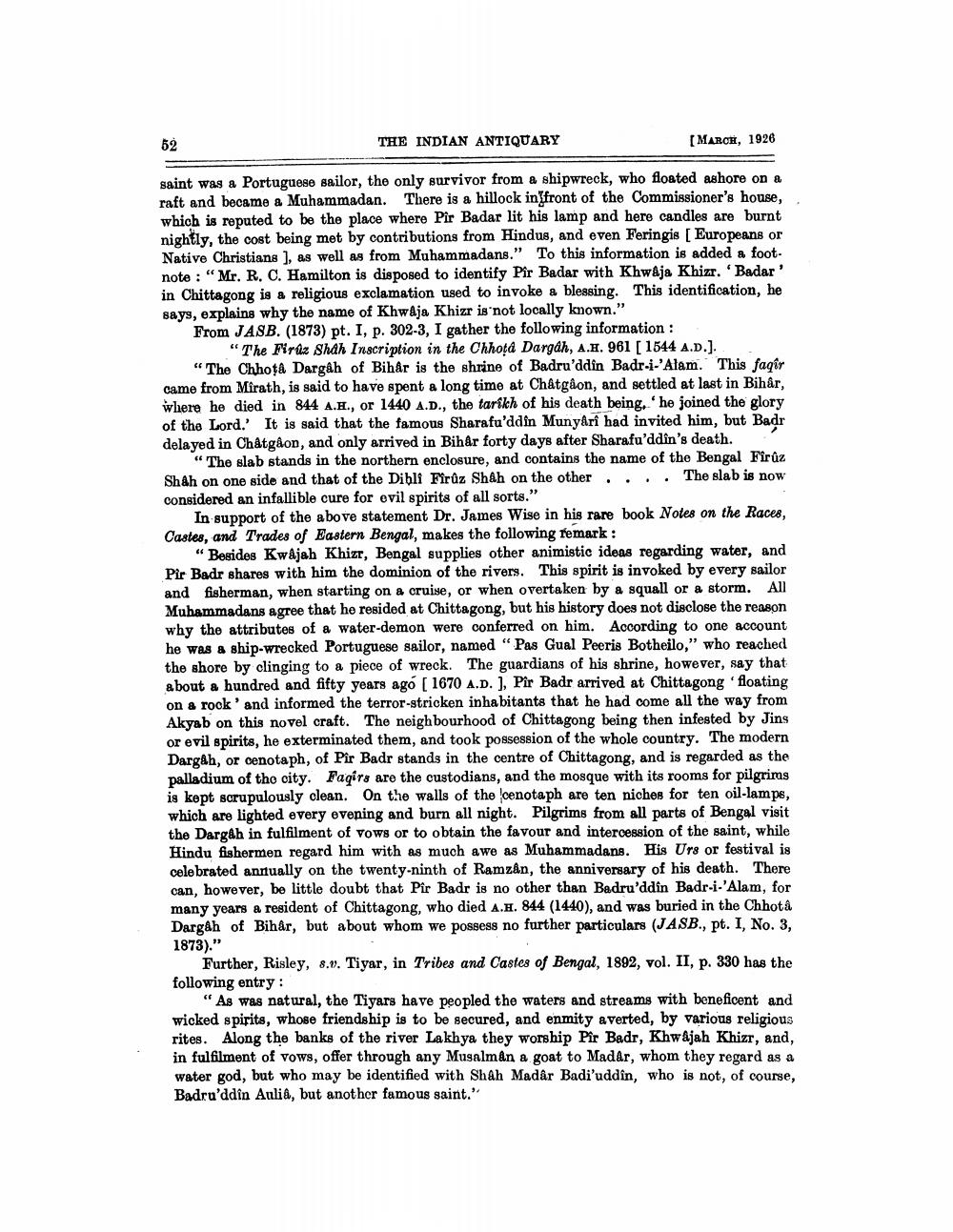________________
62
THE INDIAN ANTIQUARY
[MARCH, 1926
saint was a Portuguese sailor, the only survivor from a shipwreck, who floated ashore on a raft and became a Muhammadan. There is a hillock in front of the Commissioner's house, which is reputed to be the place where Pir Badar lit his lamp and here candles are burnt nightly, the cost being met by contributions from Hindus, and even Feringis (Europeans or Native Christians ), as well as from Muhammadans." To this information is added a footnote : "Mr. R. C. Hamilton is disposed to identify Pir Badar with Khwaja Khizr. 'Badar' in Chittagong is a religious exclamation used to invoke a blessing. This identification, he says, explains why the name of Khwaja Khizr is not locally known." From JASB. (1873) pt. I, p. 302-3, I gather the following information:
"The Firuz Shah Inscription in the Chhota Dargah, A.H. 961 [1544 A.D.). “The Chhota Dargâh of Bihår is the shrine of Badru'ddîn Badr-i-'Alam. This fagar came from Mirath, is said to have spent a long time at Châtgaon, and settled at last in Bihar, where he died in 844 A.H., or 1440 A.D., the tarikh of his death being, he joined the glory of the Lord.' It is said that the famous Sharafu'ddin Munyári had invited him, but Badr delayed in Châtgaon, and only arrived in Bihar forty days after Sharafu'ddin's death.
"The slab stands in the northern enclosure, and contains the name of the Bengal Firuz Shah on one side and that of the Dibli Firûz Shah on the other.... The slab is now considered an infallible cure for evil spirits of all sorts."
In support of the above statement Dr. James Wise in his rare book Notes on the Races, Castes, and Trades of Eastern Bengal, makes the following remark:
"Besides Kwajah Khizt, Bengal supplies other animistic ideas regarding water, and Pir Badr shares with him the dominion of the rivers. This spirit is invoked by every sailor and fisherman, when starting on a cruise, or when overtaken by a squall or a storm. All Muhammadans agree that he resided at Chittagong, but his history does not disclose the reason why the attributes of a water-demon were conferred on him. According to one account he was a ship-wrecked Portuguese sailor, named “Pas Gual Peeris Botheilo," who reached the shore by clinging to a piece of wreck. The guardians of his shrine, however, say that about a hundred and fifty years ago [ 1670 A.D.), Pir Badr arrived at Chittagong 'floating on a rock' and informed the terror-stricken inhabitants that he had come all the way from Akyab on this novel craft. The neighbourhood of Chittagong being then infested by Jins or evil spirits, he exterminated them, and took possession of the whole country. The modern Dargah, or cenotaph, of Pir Badr stands in the centre of Chittagong, and is regarded as the palladium of the city. Faqirs are the custodians, and the mosque with its rooms for pilgrims is kept scrupulously clean. On the walls of the cenotaph are ten niches for ten oil-lamps, which are lighted every evening and burn all night. Pilgrims from all parts of Bengal visit the Darg&h in fulfilment of vows or to obtain the favour and interession of the saint, while Hindu fishermen regard him with as much awe as Muhammadans. His Urs or festival is celebrated annually on the twenty-ninth of Ramzân, the anniversary of his death. There can, however, be little doubt that Pir Badr is no other than Badru'ddin Badr-i-'Alam, for many years a resident of Chittagong, who died A.H. 844 (1440), and was buried in the Chhota Dargah of Bihar, but about whom we possess no further particulars (JASB., pt. I, No. 3, 1873)."
Further, Risley, 8.v. Tiyar, in Tribes and Castes of Bengal, 1892, vol. II, p. 330 has the following entry:
"As was natural, the Tiyars have peopled the waters and streams with beneficent and wicked spirits, whose friendship is to be secured, and enmity averted, by various religious rites. Along the banks of the river Lakhya they worship Pir Badr, Khwajah Khizr, and, in fulfilment of vows, offer through any Musalman a goat to Madar, whom they regard as a water god, but who may be identified with Shah Madár Badi'uddin, who is not, of course, Badruddin Aulia, but another famous saint."




